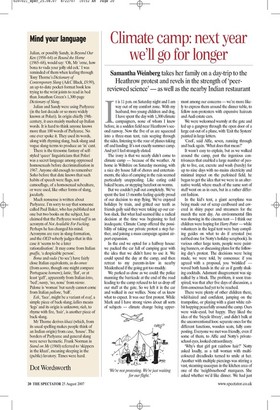Mind your language
Julian, or possibly Sandy, in Beyond Our Ken (1958-64) or Round the Home (1965-68), would say: 'Oh, Mr 'orne, how bona to vada your jolly old eek.' I was reminded of them when leafing through Tony Thorne's Dictionary of Contemporary Slang (A&C Black, £9.99), an up-to-date pocket-format book less trying to the wrist joints to read in bed than Jonathon Green's 1,300-page Dictionary of Slang.
Julian and Sandy were using Parlyaree (in the last decade or so more widely known at Polari). In origin chiefly 19thcentury, it uses mainly mashed up Italian words. It is hard to think anyone knows more than 100 words of Parlyaree. No one ever spoke it. They used its words, along with rhyming slang, back-slang and vogue slang-terms to produce an 'in' cant.
There is the tiresome fantasy of selfstyled 'queer' linguisticians that Polari was a secret language among oppressed homosexuals before decriminalisation in 1967. Anyone old enough to remember Soho before that date knows that such habits of speech were flags, not camouflage, of a homosexual subculture, or were used, like other forms of slang, jocularly.
Much nonsense is written about Parlyaree. I'm sorry to say that someone called Paul Baker, who has published not one but two books on the subject, has claimed that the Parlyaree word naff is an acronym of Not Available For Fucking. Perhaps he has changed his mind. Acronyms are rare in slang-formation, and the OED soberly judges that in this case it 'seems to be a later rationalisation'. It may come from Italian gnaffa, 'a despicable person'.
Bona and vada (to see') have fairly close Italian equivalents, as do omee (from uomo, though one might compare Portuguese homem); lattie, 'flat', or at least 'gaff', apparently from Italian letto, 'bed'; naniy, `no, none' from niente. Palone is 'woman' but surely cannot come from Italianpallone, 'ball'.
Eek, 'face', might be a variant of ecaf, a simple piece of back-slang; lallies means 'legs' and its origin is unknown; riah, to rhyme with fire, 'hair', is another piece of back-slang.
Mr Thorne derives khazi (which, from its usual spelling makes people think of an Indian origin) from casa, 'house'. The borders of Parlyaree and general slang were never hermetic. Frank Norman in Stand on Me (1960) referred to 'skippers in the khazi', meaning sleeping in the (public) lavatory. Times were hard.
Dot Wordsworth









































 Previous page
Previous page